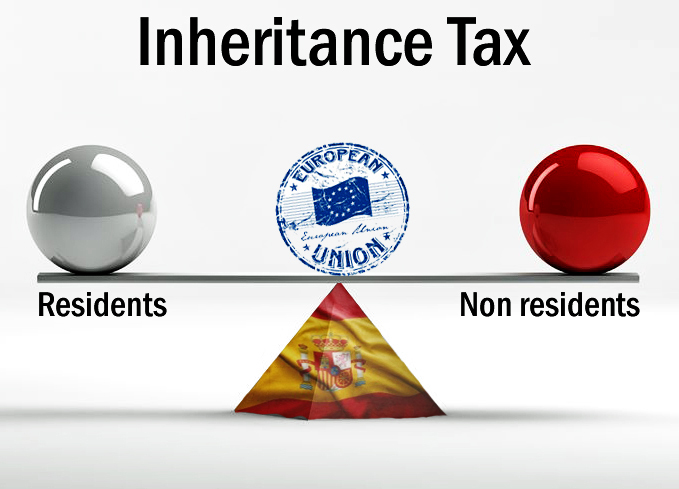
(Edited on the 15/04/2019 to include the latest changes in taxation)
Are you aware that, due to the recent changes in the Spanish Law, it is quite possible that now your beneficiaries will not have to pay any Inheritance Tax in Spain or at least their exposure to the tax is drastically reduced?
As we already advanced in previous entries of this blog (Claim now for a refunding of discriminatory inheritance tax paid in Spain), following the sentence of the European Court of Justice of 3 September 2014 the Spanish Government was forced to give a legislative response to adapt its domestic law to the requirements of that judgment.
On 25 September 2014, barely three weeks after the publication of the judgment, the Popular Party submitted a number of amendments in the lower house to the proposed law to change various tax rules, including the modification of the Additional Provision Two of Law 29/1987 of Inheritance and Gift Tax, which was finally approved unchanged by Final Provision Three of Law 26/2014 entering into force on 1 January 2015.
The urgency and the readiness of the executive in solving this problem of adaptation to European Law contrasts with the laxity demonstrated to attend the requirements made by the European Commission since 2011. The reasons for such haste in matching the rule will surely lie in the fact that once the Spanish law that contravened EU rules was declared invalid, it was null and void since its origin and not from the judgment, and therefore considering the principles of reserve of law (Art. 8 of General Taxation Law) and prohibition of analogy (Art. 14 of the same) for the delimitation of the basic elements of tribute, a legal vacuum was created that meant it was not possible to request the tribute to the taxpayers.
Before proceeding with the analysis of the new regulation, it is important to highlight that there is no express declaration of retroactivity in it, so it would only be applicable to taxable events that take place after its entry into force on 1 January 2015, leaving a legal vacuum to all taxable events prior to that time, that would not be enforceable if they had not been paid yet, and where refund plus statutory interest could be claimed in the case that the tax had been settled, according to the rules that were declared null and void by the EJC sentence.
We wondered in the aforementioned entrance of the blog if the Spanish Government would harmonize national and regional legislations, taking into account the “Lagares report” (proposals on upgrading the Spanish tax system issued by an experts committee in March 2014), and it would unify the various regional legislations on a single tax less burdensome for taxpayers, or if, in order to avoid a clash with the interests of regional Governments and their ability to regulate on the tax, it would simply allow the application of regional regulations to non-residents. Well, the Spanish Government has opted for the second solution. The State retains the competence on the taxation of non-residents, instead of transferring it to each of the regions, but it allows the application of the nearest regional legislation.
It should be noted that following the numerous judgments of the Supreme Court in this regard, the nearest regional legislation is not limited just to residents of the European Union (EU) or any of the three countries that also from part of the European Economic Area (EEA), Iceland, Liechtenstein and Norway, but applies to any person regardless of their residence.
Regardless of the law that applies to them, what situations do remain under State jurisdiction?
In succession mortis causa:
- When the deceased is not resident in Spain.
- When the heir is not resident in Spain (even if the deceased was resident).
In succession inter vivos (Donation or Gift):
- Donation of property located out of Spain when the taxpayer is resident (non-resident would not be subject to tax in Spain)
- Donation of property in Spain when the taxpayer is not resident in Spain.
What regulations do apply from 1 January 2015 and after the several sentences from the Supreme Court in that respect?
Distinctions must be made as to if the goods are acquired by inheritance or donation (gift), and according to the residence of the deceased and the location of the transferred assets.
Inheritance mortis causa:
a) Deceased resident in Spain: The successors (heirs) are subject to the application of the regional regulations corresponding to the residence of the deceased.
b) Deceased not resident in Spain: The values of all assets located within each region will be added up and the rules of the region where the assets have the highest combined value will apply. If there is no property in Spain, only those successors resident in Spain would be subject to taxation for personal obligation in the region of residence and for those assets inherited outside Spain.
Succession inter vivos or donation:
There are differences depending on the location of the property and the residence of the taxpayers:
a) Donation of property located in Spain
- Taxpayers resident in Spain: They will be taxed in the region and with the regulations applicable in the place where the property is located. For goods other than property, they will be taxed with the regulations and in the region where they have their residence.
- Taxpayers not resident in Spain: They will have to pay to the Central Government but applying the regional law of the place where the property is located. For other than real estate, it will apply the regional law corresponding to the place where the goods have been more number of days in the past five years.
b) Donation of assets situated outside Spain
- Taxpayers resident in Spain: The tax is charged by the State but settled under the rules of the regional government where the beneficiary resides.
- Taxpayers non resident in Spain (EU or non-EU residents): Obviously they are not subject to tax in Spain.
How is the regulation of the Inheritance Tax in the different regions of Spain?
As we already saw in the entry of our blog (Is it possible to avoid paying Inheritance Tax in Spain?) there are 17 Regional Governments (“Comunidades Autónomas”) with different rules applicable to the taxpayers connected to each of those places.
There several regions in which parents, children and spouses of the deceased practically pay nothing at all. Let’s see:
In Cantabria there is a 100% bonus in the final tax figure for inheritors of groups I and II.
In the Canary Islands, the final tax figure has a 99.9% bonus.
In Andalusia there is a reduction of the tax base of € 1.000.000 and the final tax bill has a 99% bonus.
In Madrid, the final tax figure has a 99% bonus.
In Extremadura the final tax figure has a 99% bonus.
In Murcia the final tax figure has a 99% bonus.
In La Rioja, there is a 99% bonus in the final tax figure should the tax base is below 500,000 € and a 98% bonus if the tax base is over that figure.
In the Basque Country are exempt of payment the first 400,000 € that inherits each heir. The rest is taxed only at 1.5%.
In Navarra there is a flat rate of 0.8% for the wife/husband from 250,000 €. Ascendants and descendants have a tax of 2% from 250,000 € to 500,000 €; 4% from 500,001 € to 1,000,000 €; 8% from 1,000,001 € to 1,800,000 €; 12% from 1,000,000 € to 3,000,000 €; and 16% from 3,000,001 €.
In Castilla La Mancha there is a bonus in the final tax bill of 100% when the tax base is below 175,000 €; 95% for tax bases between 175,001 € and 225,000 €; 90% when the tax base is between 225,001 € and 275,000 €; 85% for tax bases between 275,001 € and 300,000 €; and a bonus of 80% for tax bases exceeding 300,000 €.
In Catalonia, the spouse has a 99% bonus and children have a bonus that starts at 99% and is reduced as the taxable figure increases. For example for a taxable figure of 1,000,000 Euros the bonus is 84.60%. Furthermore 95% of the value of the family home is exempt with a maximum figure of 500,000 €.
In the Valencia region (Costa Blanca) There is a 75% bonus applicable to the final tax figure for children under 21 (group I) and a 50% bonus on the final tax bill for the spouse, children over 21 and parents (group II). There are also reductions in the tax base with regard to the inheritance of the main property.
In the Balearic Islands there is a 99% bonus over the tax figure for children under 21 (group I). There is a reduction on the tax base of € 25,000 per each beneficiary of group II (spouse, children over 21 and parents). That amount goes also higher for children under 21. Both groups (I and II) are taxed at 1% up to 700,000 €; at 8% from 700,001 € to 1,000,000 €; at 11% from 1,000,001 € to 2,000,000 €; at 15% from 2,000,001 € to 3,000,000 €; and at 20% from 3,000,001 € onwards. 100% of the habitual residence is deducted from the tax base up to a maximum of 180,000 € per heir (children, parents and spouse) who have lived with the deceased.
In Galicia heirs under 25 pay almost no tax considering the huge reductions in the tax base and the bonus in the final tax figure. The allowance in the final tax figure is 99% for children under 21 years (group I). There is a reduction on the tax base of 400,000 € for group II (spouse, children over 21 and parents). Both groups (I and II) are taxed at 5% up to 50,000 €; at 7% from 50,001 € to 125,000 €; at 9% from 125,001 € to 300,000 €; at 11% from 300,001 € to 800,000 €; at 15% from 800.001 € to 1.600.000 €; and at 18% from 1,600,000 € onwards. The main property also has a 100% allowance for the spouse and at least 95% for children and parents up to 600,000 Euros value.
In Castilla León there used to be a 99% bonus applicable to the final tax figure but not any more. Now they have a reduction on the tax base of € 60,000 Euros per beneficiary of group II (spouse, children over 21 and parents), amount that goes higher for children under 21. There is also another reduction on the tax base of € 400,000 less any figures that might have been deducted.
In Aragón children under 18 pay almost no tax considering the 100% reduction on the tax base with the limit of 3,000,000 €. Children over 18 and the spouse have a 100% reduction in the tax base with a limit of 150.000 € and provided that the value of their preexisting assets do not exceed 402.678,11 €. There is a bonus of 65% of the resulting tax figure provided that the taxable amount is equal to or less than 100.000 € and the heir’s preexisting estate does not exceed 100.000 €. This bonus in the final tax figure is incompatible with the abovementioned reductions in the tax base. Finally, for all of them apply a reduction to 99% of the tax base on the main residence with a limit of 125.000 € per beneficiary. The property must be kept in their estate for 5 years.
In Asturias, there is a reduction in the tax base for the spouse and direct relatives when the value of the assets and rights acquired (besides the habitual residence) does not exceed 300,000 €. In that case the taxable base will be zero. Both groups (I and II) are taxed at 21.25% up to € 56,000; To 25.50% from € 56,001 to € 216,000; To 31.25% from € 216,001 to € 616,000; And to 36,50% from 616,001 €. Acquisition of the main residence has a reduction between 99% and 95% depending on the value.
Resuming, in a good number of regions , those property owners who have had the foresight to grant a Spanish Will shall find that in the majority of cases their heirs will not have to pay Inheritance Tax, and if they have to pay it, would very rarely reach a high rate.
Conclusions
We believe that the undertaken reform brings good news for our clients, especially after the Supreme Court sentences that have extended the harmonization also to non residents within the EU, because it reduces their exposure to Inheritance and Donation tax, but the new rules do not succeed in putting to rest the voices that internally claim that the different treatment to Spanish residents depending on where they live might be a case that borders unconstitutionality.
It is not unreasonable to think that it may be unconstitutional for violating, to a greater or lesser degree, the principles of equality, tax justice and legal security because it reflects discrimination in tax treatment between residents and Spaniards living in one autonomous community or another.
Luis M. Vicente Burgos
VICENTE & OTAOLAURRUCHI ABOGADOS






